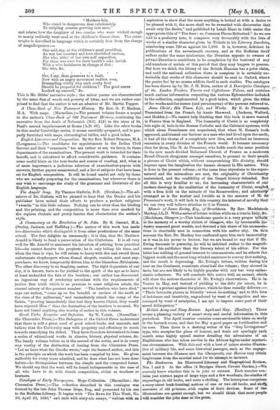Catalogue of Early Newspapers. Hope Collection. (Macmillan : the
Clarendon Press.)—The collection described in this catalogue was formed by the late John Thomas Hope, Esq., and presented by his son to the Bodleian Library, It begins with "The News for This Week, No. 20, April 23, 1640," and ends with sixty-six essays, "written with an
aspiration to show that the more anything is looked at with a desire to. be pleased with it, the more shall we be rewarded with discoveries that await only the desire," and published by Leigh Hunt in 1840, under the appropriate title of " The Seer : or, Common Places Refreshed." As we are told in a prefatory note, it compares very favourably with the lists of works of a similar character given by Nichols in his Literary Anecdotes,. numbering some 760 as against his 1,100. It is, however, deficient ih publications of the seventeenth century, and as the Bodleian itself suffers under the same misfortune, the librarian appeals to owners of private libraries to contribute to its completion by the bestowal of any odd numbers• of serials of this period that they may happen to possess. But here we think the library of the British Museum has a prior claim,. and until the national collection there is complete it is certainly un- desirable that works of this character should be sent to Oxford, where the genius loci by no means addicts itself to such studies. The catalogue has been drawn up by Mr. J. H. Burn, author of A Descriptive Catalogue- In_ of the London Traders, Tavern and Coffeehouse Tokens, and contains. much curious information respecting the various Ephemerides included in the collection, supplemented by a good index, which gives the titles. of the works and the names (and pseudonyms) of the persons referred to. Jesus Christ; His Times, Lift, and Works. By E. de Presseneet Translated from the Front& by Annie Harwood. (Jackson, Watford,, and Hodder.).—We cannot help thinking that this book is more wanted in France than in England. The humanity of Christ is so completely lost sight of, bothin the Roman Catholic and the Calvinist systems, with. which alone Frenchmen are acquainted, that when M. Renan's book appeared, and treated our Saviour as a man who had lived upon the earth,. it had all the charm of a completely new idea, and excited an immense sensation in every division of the French world. It became necessary then for those, like M. de Presseusd, who holds much the same position in the now much divided Reformed Church of France as a moderate Broad-Church clergyman amongst ourselves, to present to their people „ a picture of Christ which, without compromising His divinity, should impress upon the imagination the human element in His nature. This is done in the present volume ; at the same time objections to the super- natural and the miraculous are met, the originality of Christianity maintained, and the credibility of the Gospel history defended. But all this is very familiar to us; the increasing characteristic of our






























 Previous page
Previous page